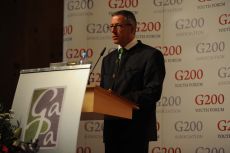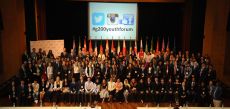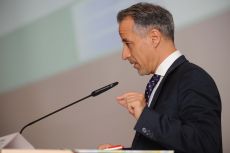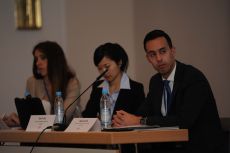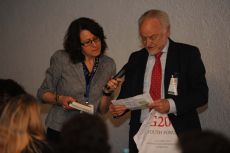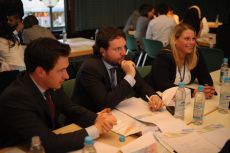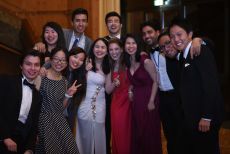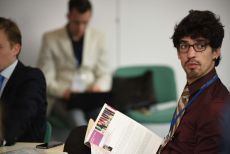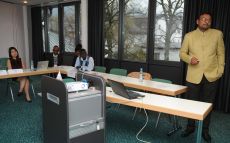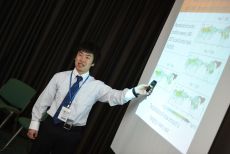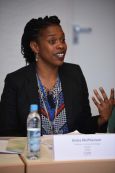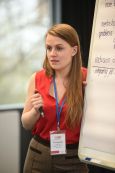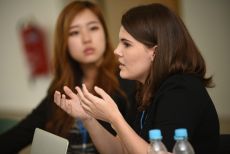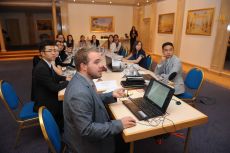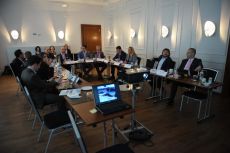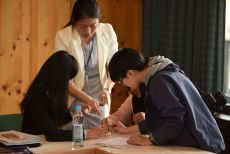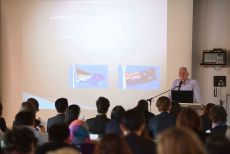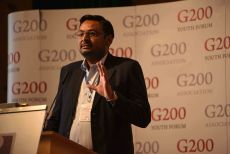Agenda
I. G200 Youth Summit Committees
Committee 1: Global Health
The health care system of the world, as well as many other areas, is constantly being improved and modernized. The main aim of all humankind is to enhance the quality of medical care. Health care should be a priority of public policy around the world. There are many urgent issues such as Availability and Quality of Healthcare, Medical Training Programmes, Medicines, Child Health, Basic Health Services and financing them. The aim of the Healthcare Committee is to identify not only the gravest health concerns, current and painful issues, but also to offer governments and healthcare organizations possible innovative solutions, as well as proposal for transforming the Health Care system.
The G-200 Summit Global Health Committee will develop recommendations relevant to the international organizations, national and local governments, private sector, NGO’s, communities as well as recommendations, which can be implemented by every participant of the Committee in his or her country at the individual level.
Committee 2: Shaping the Labour Market
Today’s labour market is characterized by a contradiction: on the one hand, the high percentage of unemployment, on the other - a shortage of skilled workers. That is why, in order to ensure a
high rate of economic growth, great attention is given to the problem of improving the quality of the labour force. Young people will play an important role in this task. But in the modern society the youth are faced challenges of various kinds such as a misbalance in the occupational skill structure of employment, the failure to utilize gaining knowledge and skills, absence of demand of professionals (licentiates) after graduation, and structural unemployment. In the current economic situation the Labour Market Committee has not only to answer the essential question as to how to ensure the functioning of the labour market, but also to develop policy recommendations for both developed and developing countries’ authorities in order to provide a breeding ground for future generations.
The G-200 Summit Shaping the Labour Market Committee will develop recommendations relevant to the international organizations, national and local governments, private sector, NGO’s, communities as well as recommendations, which can be implemented by every participant of the Committee in his or her country at the individual level.
Committee 3: From Consumer Society towards 'Value-based' Society
Overconsumption is costing us the Earth and human happiness. In our society, consumers are purchasing more and more items, and throwing more of it, when it’s relatively short useful life is over, away. The global waste crisis tends to be defined both a problem of production and a problem of consumption. Production processes are wasteful: many materials used, not enough by-products recycled. Consumers do not know where the waste by-products from the manufacturer of consumer items they buy end up, or even what that waste is composed of. Post-consumer waste and pre-consumer wastes are making their way around the world, with detrimental environmental and social impacts of which consumers have little understanding. It calls for humanity to think over what environmentally responsible consumption decisions could be made, how we could stop exceeding the ‘carrying capacity’ of the planet, how to reconstruct our society into the world where we consume less and value more. An age in which product repair is a common and natural activity may return, the recycling technologies may be developed.
The ‘from Consumer Society towards Value-based Society’ Committee will develop recommendations relevant to the international organizations, national and local governments, private sector, NGO’s, communities as well as recommendations, which can be implemented by every participant of the Committee in his or her country at the individual level.
Committee 4: New Strategies for Financial Sector and World Economy
The modern world is characterized by a combination of acute challenges and difficulties exposed by the global financial and economic crisis. It is true that around the world economic growth is picking up pace, deep challenges remain, including poverty, environmental degradation, persistent unemployment, political instability, violence and conflict. The change process of economic and financial picture of the world is characterized by globalization, which generates economic growth reconstructing the world. But the benefits of globalization are unevenly
distributed, leading to the change in the balance of economic power among countries and to the growth of disparities. The problems of economic disparities and inequalities do not lose their importance, both nationally and internationally. However, such processes solve some problems posing others. In addition to global the New Strategies Committee will answer a number of acute questions. What positive and negative events are expected in the global economy over the coming years? What risks will it lead to? And how can we influence the current situation? At the end it will elaborate on recommendations to global risk challenges and address this appeal to financial ministries and other concerned organizations.
The G-200 Summit New Strategies for Financial Sector and World Economy Committee will develop recommendations relevant to the international organizations, national and local governments, private sector, NGO’s, communities as well as recommendations, which can be implemented by every participant of the Committee in his or her country at the individual level.
Committee 5: Technological Challenges
The 21st century demands a radical rethink of how we use science in the service of society. During this time we will perhaps be facing the greatest challenge in the history of humanity: sustaining a great amount of people on a planet where natural resources are running scarce. At the same time our century faces the greatest technological challenges. Development of economical solar energy and fusion-energy, crafting carbon sequestration methods, improving access to clean water, reversing the effects of ageing, reprogramming genes to prevent diseases, digital innovation and transformation, other pressing needs are some of the biggest issues for the modern world. The solutions to many of these issues will come from emerging areas of science and technology that include nanotechnology, as well as areas such as synthetic biology,
quantum physics and cognitive science. The innovations are supposed to improve our life style in all spheres of the individual life and the life of society; especially healthcare and food production through programming of cells, space exploration through the launch of space planes and advanced research satellites, and diversification of energy sources through the production of energy materials, etc.
The G200 Summit Technological challenges committee will develop recommendations on how we should use science in the service of society, and relevant to the international organizations, national and local governments, private sector, NGO’s, communities as well as recommendations, which can be implemented by every participant of the Committee in his or her country at the individual level.
II. Conference Round tables
Economics and Finance
Law and Human Rights
World Politics and International Relations
Social Affairs and Medicine
Ecology, Environment, and Energy
Design, Technology, and Innovations
Education and Youth
Humanities: History, Philosophy, Linguistics, Arts and Journalism.
III. International Young Parliamentarians' Debate Committees
Women’s rights, family, child support and welfare;
Sport and youth policy, culture, education and media;
Business and entrepreneurship, innovations and energy;
Local development, sustainability, transport and tourism.
IV. Joint Sessions Round tables
I. Security Education: A Need? or A Must?
Does this generation need to be properly and formally educated about security? In the wake of extremism that is sweeping across the world and seriously threatening the core values of civilization, coexistence, diversity and compassion, what is our role as educators and education policy makers to safeguard the generation and protect them from an ISIL ghost behind a screen trying enlist them as zealous jihadists? Schools in the West and other corners of the world offer sex education, environmental education, and so on and so forth. Isn’t it time that we thought about adding security education to our curricula? If yes, then how? And is it possible to expand the concept of security education to cover most pertinent threats and dangers that our children and youth need to be aware of and capable of protecting themselves against them? Online threats, rape, and bullying, are but a few examples. Children and youth are a very susceptible group of people and this is a well-known fact. Don’t they need to be taught how to “sniff” a possible danger and responsibly and courageously protect themselves against it? Isn’t this education needed to foster good citizenship? Isn’t it a must “now”?
Subtopics
1. The Scope of Extremism. Extremism and Other Threat
Is extremism a local, regional, or global threat?
In addition to extremism, which is the most dangerous threat that must be addressed, what are the other most pertinent threats (that jeopardize the individual student, his/her family, his community and world peace at large) that security education must focus on? Where do these threats come from?
2. Goals & Objectives of Security Education. Justification and Rationale of Security Education.
What is the ultimate goal of security education?
What are the justifications of offering security education in schools?
3. Research into Security Education. Policies & Procedures
What research is needed in order to form a comprehensive outlook and understanding of the scope of security education?
What policies and procedures are needed in order to offer security education successfully?
4. National Curricula & Security Education. Knowledge, Competencies & Skills
How should national curricula develop the sense of personal, societal and national security in students? Should security education be taught as an independent school subject, for example?
What knowledge, competencies and skills do curricula need to enable the students with in order to survive the threat of extremism (and other threats) in the 21st century?5
5. Social Media & Security Education
How can we protect youth from the threats that come from the open world of social media and technology without impacting their positive relationship with it and benefit from its potential? What skills should young users of social media learn and develop to use the open world of the social media safely?
II. Perceiving Happiness
In this Joint Session on Perceiving Happiness we will consider three overarching themes which are essential to increasing global happiness and well-being: 1) how we define and measure happiness, 2) how we teach and learn happiness and well-being 3) and how we move forward sustainably. In discussing each theme it may be helpful to consider both individual and collective perspectives, as well as the similarities and differences which are relevant to the context of our particular community, country and continent. We will also use the opportunity to reflect on our own unique strengths and interests, how these inform our viewpoints and how we can apply them to make a positive difference in the world.
Subtopics
1 Defining and Measuring Happiness
“Too much and for too long, we seem to have surrendered personal excellence and community value in the mere accumulation of material things. Our Gross National Product...counts air pollution and cigarette advertising, and ambulances to clear our highways of carnage. It counts special locks for our doors and the jails for the people who break them. It counts the destruction of the redwood and the loss of our natural wonder in chaotic sprawl. It counts napalm and counts nuclear warheads and armored cars for the police to fight the riots in our cities... and the television programs which glorify violence in order to sell toys to our children. Yet the Gross National Product does not allow for the health of our children, the quality of their education or the joy of their play. It does not include the beauty of our poetry or the strength of our marriages, the intelligence of our public debate or the integrity of our public officials. It measures neither our wit nor our courage, neither our wisdom nor our learning, neither our compassion nor our devotion to our country, it measures everything, in short, except that which makes life worthwhile.” Robert F. Kennedy 1968
Given that traditional economic measures such as GDP are no longer deemed sufficient indicators of societal progress, what measures should we use?
How can we promote the use of new measures and ensure that they are given the same credibility and become part of everyday language in the same way that GDP is?
How do we make Kennedy’s words irrelevant by 2018 (50 years on)?
Greater material wealth does not automatically lead to greater happiness, individually or collectively. How do we balance economic and happiness goals so that they compliment each other, rather than compete with or undermine each other? How do we balance individual and collective needs?
2. Happiness and Well-being in Education
Give a man a fish and you feed him for a day; teach a man to fish and you feed him for a lifetime (Proverb)
Given the vital role that happiness plays in the success of individuals, societies and nations (the ‘Decent Society’), how do we learn the science behind happiness and the skills to put it into practice?
‘In most schools, maths and science are more important than languages. Languages are more important than art and music. Drama and dance are not important at all’ (quotation from UK TeachersTalk forum). How do we prioritise the teaching and learning of happiness and well-being in a typical school? What knowledge and skills do we need to include in school curricula? What are the implications - for parenting roles, teacher training, qualifications and so on?
If happiness and well-being are not taught at school, how will young people learn the science of happiness and the skills to put it into practice for themselves and their communities?
3. Happiness: a Serious Business
“We cannot solve our problems with the same thinking we used when we created them”. Einstein
Given the vital role that happiness plays in the success of individuals, societies and nations (the ‘Decent Society’), how can Positive Psychology (the scientific study of optimal human functioning) inform how we tackle urgent global issues, aside from health?
From a top-down (rather than bottom-up) perspective, how do we ensure that rigorous scientific knowledge, thinking and evidence on happiness and well-being are routinely incorporated into policy?
4. Well-being through Social Aspects
“No man is an island”. John Donne
Happiness plays a role in every aspect of human life, from cradle to grave and all the stops in between. It is a fundamental aspect of a ‘Decent Society’. How do we ensure that ministries and international organisations consider happiness and well-being issues seriously, and work together to create and sustain a ‘Decent Society’?
5. Moving Forward Sustainably
“Happiness is not a spectator sport”. Chris Peterson
What are your unique strengths and interests? How will you apply them to make a positive difference for other young people who are not here?
From a bottom-up (rather than top-down) perspective, what are the key 3-5 things that you will do to increase the amount of human happiness in the world?



